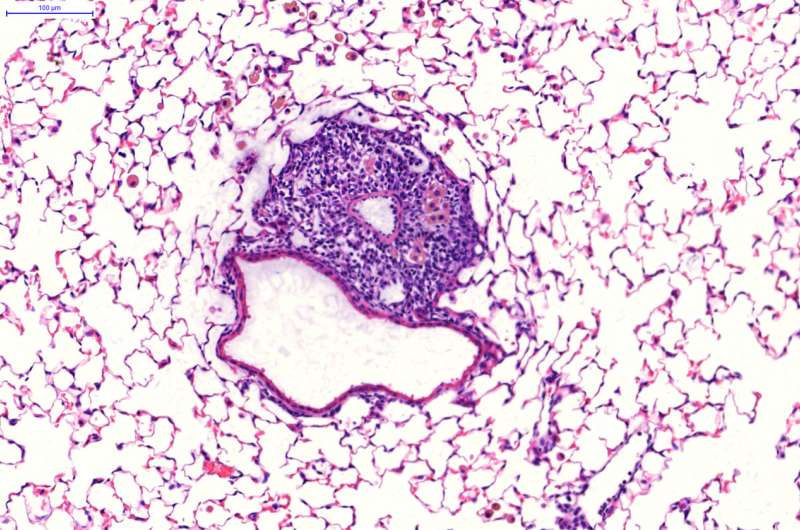COPD-associated inflammation halted in model experiment

Chronic obstructive pulmonary disease (COPD), is believed to be the third most common cause of death worldwide. However, because the underlying mechanism is still largely unknown, today's treatments can only slow progression of the disease. Scientists at Helmholtz Zentrum München have now reported a previously unknown pathogenic mechanism, which they have already been able to prevent in the laboratory. Their findings are reported in EMBO Molecular Medicine.
Cigarette smoking and general environmental pollution pose the greatest risks for COPD and lead to an inflammatory reaction in the airways and lung tissue. As a result, sufferers develop chronic cough, sputum production and shortness of breath. In the long term, lung tissue is destroyed, which makes breathing more difficult.
In a recent paper, a team led by Dr. Ali Önder Yildirim shed new light on the inflammatory process. "We focused on tertiary lymphoid organs in the bronchi," explains Yildirim, one of the acting directors of the Institute of Lung Biology at Helmholtz Zentrum München, a member of the German Center for Lung Research (DZL). Specifically, the researchers studied what is known as inducible bronchus-associated lymphoid tissue, or iBALT for short. "It is believed that the development of iBALT plays a key role in the deterioration of COPD, but until now, it was unclear exactly how iBALT forms," says Yildirim.
Therefore, the lung specialists looked for known processes in other lymphoid tissues. In this context, their attention was drawn to the metabolism of oxysterols. Oxysterols are derivatives of cholesterol that play a role in a wide range of biological processes, including the positioning of immune cells in lymphoid tissue.
"We wanted to find out whether that is also the case around the lungs and specifically in cigarette-smoke-induced COPD," Yildirim says. In fact, the researchers found elevated levels of enzymes involved in oxysterol metabolism together with immune cells that migrate into the tissue both in the experimental model and in the lungs of COPD patients. Further experiments also showed that iBALT formation is inhibited if the metabolic enzymes are absent. Their absence also prevented the migration of immune cells and damage to the lungs despite exposure to cigarette smoke.
The scientists then attempted to recreate this effect pharmacologically by blocking the oxysterol pathway with an inhibitor, which they found prevented the immune cell migration following cigarette smoke irritation and therefore iBALT formation in the experimental model. "Our future goal is to transfer the results from the model to humans with a view to intervening in the development of COPD," Ali Önder Yildirim says. "There is still a lot of work to do, however we are very much looking forward to it."
More information: Jie Jia et al, Cholesterol metabolism promotes B‐cell positioning during immune pathogenesis of chronic obstructive pulmonary disease, EMBO Molecular Medicine (2018). DOI: 10.15252/emmm.201708349

















